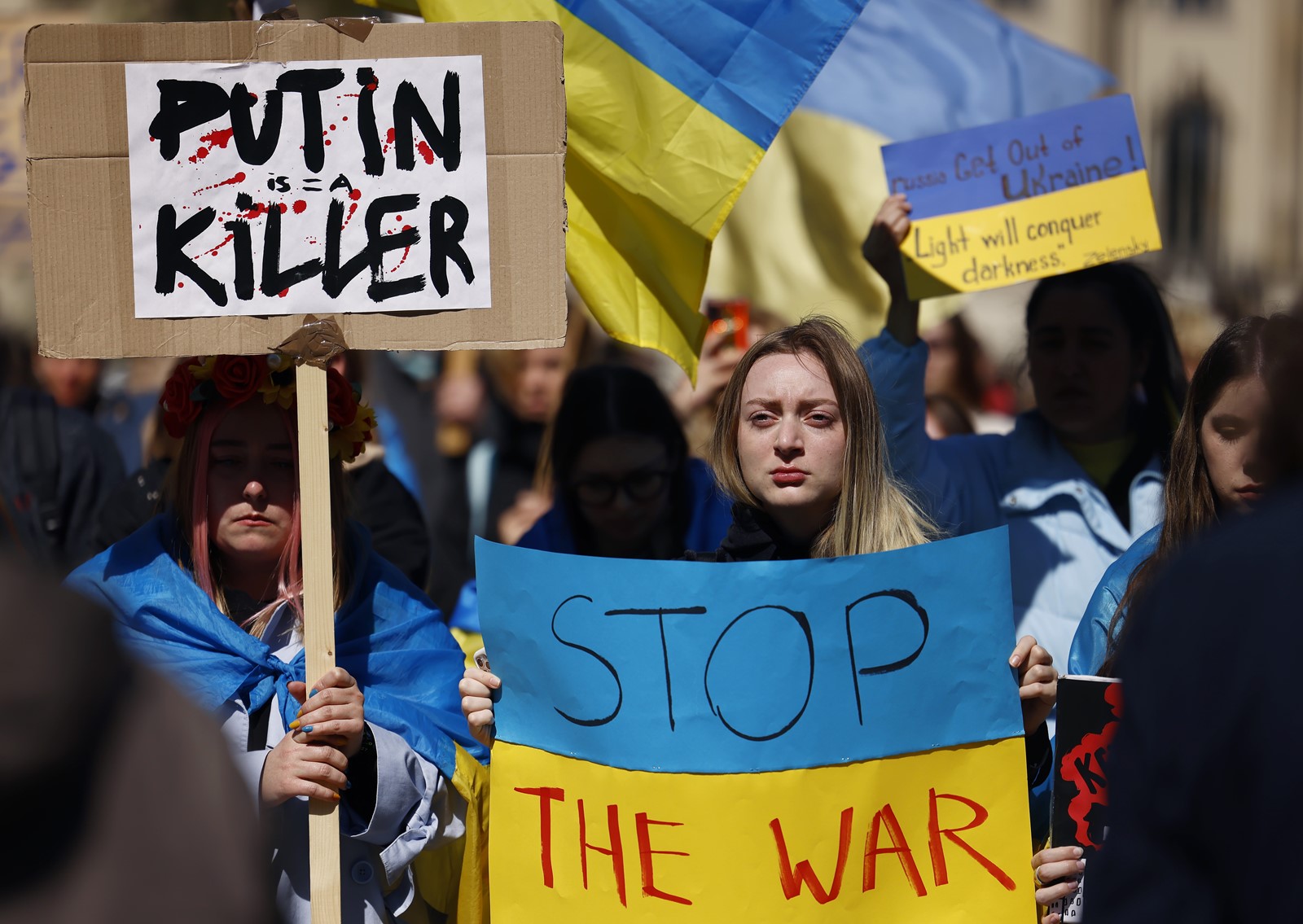In Germany, Soviet immigrants echo Putin
Many back Moscow’s invasion of Ukraine and oppose what they see as ‘Russophobia.’

As he joined a convoy organized to protest anti-Russian sentiments, he affixed to the hood of his vehicle a sign emblazoned with the Star of David.
“What used to be the evil Jew [during Germany’s World War II Nazi era] is now the evil Russian,” he said. “Russophobia is everywhere.”
Since the Russian invasion of Ukraine, there have been protests worldwide against Moscow’s actions, including in Germany, where activism abounds in Berlin and elsewhere. The rise in voices has led to some Russia-bashing. But it is no secret that many of the more than 2 million immigrants from the former Soviet Union who live in Germany are strong supporters of Russian President Vladimir Putin, and they have never been shy about publicly expressing their support.
It’s being overtly expressed in the appropriation of the Star of David — widely recognized as a symbol of Judaism and Jewish identity — in much the same way that those opposed to COVID-19 vaccination and mask mandates have used the symbol and referenced the Holocaust to express outrage at rules they label as fascism akin to that of Nazi Germany.
While depictions of the Star of David — and the Holocaust — in such a manner are viewed as offensive, it is not the only symbol the pro-Russia crowd in Germany has adopted.
In addition to huge Russian flags, the letter Z — which has been seen on Russian tanks and trucks in Ukraine and stands for
Herrmann, who is German, said he has not experienced Russia-bashing but notes that the internet is filled with stories.
Since the start of the war, more than 500 criminal acts linked to discrimination against Russians, Ukrainians living in Germany and supporters on either side of the divide have been reported to authorities. They’ve mainly been limited to property damage and insults. These encounters are also reflected in entries on the website of the Russian Embassy in Berlin, where people can report such incidents. The anonymous reports are all minor and at times difficult to verify.
“We must be very careful that this war does not spill over into our society,” said Nancy Faeser, Germany’s interior minister. “This war must not be fought on the backs of Ukrainians or Russians in Germany.”
Although the offenses remain small in scale, they are fodder for Moscow’s supporters. A Telegram channel called “Putin Fanclub” counts nearly 33,000 subscribers; similar channels, such as “News from Russia,” have more than 127,000.
Among the Germany-based Putin backers, the war is regularly referred to as the “liberation of Ukraine.” Platforms such as the far-right Compact magazine hail German-Russian friendship.
All of these groups play to existing anti-American, anti-NATO and anti-Western sentiments.
“The mindset of the radical right is entirely on the same anti-Western course as Putin,” said Matthias Quent, a researcher at Germany’s University of Applied Sciences in Magdeburg, who sees a lot of overlap with other groups.
“When Russian flags fly at anti-COVID rallies in Saxony, or when protesters march in front of the Russian Embassy and then shout slogans like ‘Putin, liberate us,’ there’s clearly an intersection of interests.”
He noted that the Telegram channel “Compact Magazine,” which has more than 60,000 subscribers, distributes videos from the blocked Russian propaganda television network RT.
“Polarization is definitely increasing,” Quent said. “By many, the ban of RT is seen as evidence that they are in fact telling the truth.”
Reports of Russophobia fall into the same pattern.
“When incidents, real or fake, are reported, they immediately go viral on social media,” he said. “In the end, no one knows what is really going on.”
Whether the incidents are based on fact or fiction, the rifts in society are growing deeper.
With new convoys and protests staged in German cities recently, the question remains: Why is there still a vocal minority adopting a pro-Russia line?
Many members of that minority are of German ancestry. They left the former Soviet Union because they felt like strangers there and wanted to return to their homeland.
“But here in Germany, they were seen as Russians, not Germans. At some point, they started thinking, ‘All right, if we’re seen as Russians, we’ll act like it,’ ” said Vladimir Kaminer, one of the best-known contemporary Russian writers, who has lived in Berlin for more than 30 years. “When you lose your social status, you quickly develop an inferiority complex.”
One way to compensate is to take on the role of victim, said Kaminer, who has long engaged in German-Russian soul-searching.
When a 75-year-old historian in Detmold, North Rhine-Westphalia, answered the phone at his home, Russian radio could be heard in the background. The man — he declined to be identified out of privacy concerns — is of German descent, and his family moved from Kazakhstan to West Germany in 1983. Asked about his feelings toward Russia, he quickly took a stand.
“The West supports the bandits in Kyiv,” he said. “With the eastward expansion, NATO broke its promises to Russia. Russia was in danger and had to defend itself.”
Everything he said seemed to come straight from the Kremlin’s playbook. Addressing the hundreds of Ukrainian civilians killed in Bucha, he maintained a firm voice.
“They’re all actors,” he said. “And so is their president. They can’t be trusted.”


